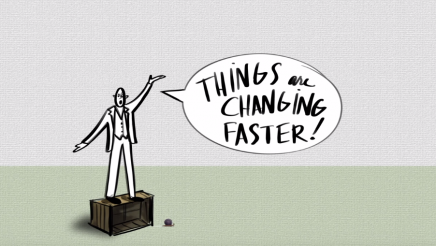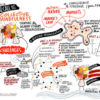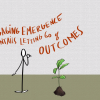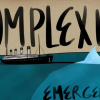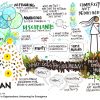Would you trust and AI colleague?
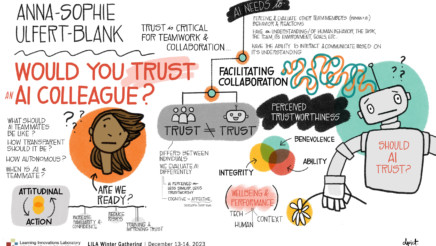 Anna-Sophie Ulfert-Bank's session centered on unraveling the complexities of trust within our human-AI collaborations. She shed
light on the challenges and intricacies of defining and measuring trust in dynamic team settings, and shared her evolving research into the nature of trust within AI teams, considering factors ranging from
technology to human dynamics and More »
Anna-Sophie Ulfert-Bank's session centered on unraveling the complexities of trust within our human-AI collaborations. She shed
light on the challenges and intricacies of defining and measuring trust in dynamic team settings, and shared her evolving research into the nature of trust within AI teams, considering factors ranging from
technology to human dynamics and More »
Leadership as Possibility-ship
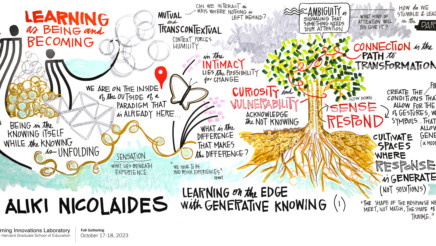 Dr. Nicolaides introduced the concept of “generative knowing,” defining it as away of being and becoming that creatively activates potential and restores many rhythms of learning. This concept can serve as a bridge to a fundamental query: Why are we continuing to meet the moment as if stability exists? This question emphasizes the importance of responding to complexity
and creating conditions for emergence. This means not simply adapting to change or difference, but actively engaging with More »
Dr. Nicolaides introduced the concept of “generative knowing,” defining it as away of being and becoming that creatively activates potential and restores many rhythms of learning. This concept can serve as a bridge to a fundamental query: Why are we continuing to meet the moment as if stability exists? This question emphasizes the importance of responding to complexity
and creating conditions for emergence. This means not simply adapting to change or difference, but actively engaging with More »
Past,Present and Future Orientation: Which is Best for Teams?
 As Mara Waller shared during the recent Harvard LILA gathering, a balanced time perspective (BTP) entails maintaining a balanced approach toward past, present, and future temporal biases. BTP is associated with positive outcomes, including higher levels of well-being, mental health, cognitive functioning, and interpersonal relations. Within teams, individuals with BTP contribute to overall More »
As Mara Waller shared during the recent Harvard LILA gathering, a balanced time perspective (BTP) entails maintaining a balanced approach toward past, present, and future temporal biases. BTP is associated with positive outcomes, including higher levels of well-being, mental health, cognitive functioning, and interpersonal relations. Within teams, individuals with BTP contribute to overall More »
Insights from Interactions: How do teams manage complexity? with Mary Waller
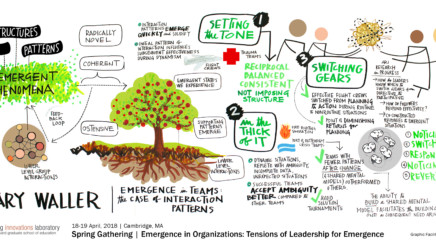 Mary has studied what makes teams effective in a variety of dynamic contexts, such as flight crews, nuclear power plant engineers, hospital trauma teams, fire-fighting teams and emergency crisis teams. In her studies of interaction patterns she has identified some key lessons for leaders to keep in mind:
Setting the tone: interaction patterns emerge quickly and solidify. Initial patterns of interactions influence the subsequent effectiveness during dynamism. Teams that had reciprocal, balanced and consistent interaction patterns performed better in highly adaptive situations.
In the thick of it: when teams face ambiguity, uncertainty, and incomplete data effective teams accept ambiguity better and avoid “solution tournaments.” Teams that have fewer entrenched interaction patterns were able to drop routines and adjust more effectively than teams that had more.
Switching gears: Planning happens during routine activities, or “slack time”.” However, too much planning time isn’t effective -- there is a sweet spot.
Her current research in military settings is now looking at how leaders switch gears from being directive to More »
Mary has studied what makes teams effective in a variety of dynamic contexts, such as flight crews, nuclear power plant engineers, hospital trauma teams, fire-fighting teams and emergency crisis teams. In her studies of interaction patterns she has identified some key lessons for leaders to keep in mind:
Setting the tone: interaction patterns emerge quickly and solidify. Initial patterns of interactions influence the subsequent effectiveness during dynamism. Teams that had reciprocal, balanced and consistent interaction patterns performed better in highly adaptive situations.
In the thick of it: when teams face ambiguity, uncertainty, and incomplete data effective teams accept ambiguity better and avoid “solution tournaments.” Teams that have fewer entrenched interaction patterns were able to drop routines and adjust more effectively than teams that had more.
Switching gears: Planning happens during routine activities, or “slack time”.” However, too much planning time isn’t effective -- there is a sweet spot.
Her current research in military settings is now looking at how leaders switch gears from being directive to More »
As we come together with the LILA Community at large, we will integrate our understanding of an Emergent Organization by revisiting some of the ideas from the year-‐long exploration and inviting new voices into the conversation.
Documents to Prepare for the Gathering
| Title |
File Name |
Caption |
Date |
| 12th Annual LILA Summit Agenda |
12th-Annual-LILA-Summit-Agenda-.pdf |
|
April 9, 2018 3:27 pm |
| LILA 2018 Summit Participants |
2018-SUMMIT-Attendees-report.pdf |
A list of the members, staff, and guests in attendance. |
May 29, 2018 11:49 am |
| June 2018 LILA Brief final |
June-2018-LILA-Brief-final.pdf |
This is the briefing document for the 12th Annual LILA Summit - Engaging Emergence: Shaping the future as it unfolds. |
May 27, 2018 1:00 pm |
| LILA Summit 2018 P&P |
LILA-Summit-2018-PP.pdf |
This document has the description of the P&P sessions for the June 2018 LILA Summit. |
June 4, 2018 4:29 pm |
Materials from the Gathering
| Title |
File Name |
Caption |
Date |
Optional Readings
| Title |
File Name |
Caption |
Date |
Blog Posts
Want to share your thoughts? Click here »
-
As Mara Waller shared during the recent Harvard LILA gathering, a balanced time perspective (BTP) entails maintaining a balanced approach toward past, present, and future temporal biases. BTP is associated with positive outcomes, including higher levels of well-being, mental health, cognitive functioning, and interpersonal relations. Within teams, individuals with BTP contribute to overall effectiveness.
-
This has been another intriguing year at LILA as we have taken on the theme of Collective Mindfulness: Shaping the Human Systems in Organizations. I hope that you will join us at this year’s LILA Summit on June 12th in Cambridge where the two keynote speakers are Rob Cross and Ryan Quinn. They will be joined by six past LILA faculty who will share their latest research with participants during small group conversations. In these sessions, you will have an opportunity to exchange ideas on how the research can inform your individual and organizational practices. The Summit is also a great occasion to meet and interact with the broader LILA community, including faculty, researchers, and current and past members, and to get a better sense as to who we are as a learning community and what you might experience as a member.
-
The seeds of innovation and "becoming" reside in these random, unpredictable fluctuations. When the things we want spontaneously sprout up, we might call it serendipity in hindsight, but we often suppress deviations from the norm before it's even possible to guess the nature of what is germinating. Engaging with emergence entails letting go of preconceived solutions, a daunting challenge when performance measures loom at every level.
-
Sometimes it seems like it would be easier to start from scratch than to achieve wide-scale change in an organization. This might explain, in part, why restructuring is so common. The science of complexity offers insights into why this rarely results in lasting change. Emergence, the arising of ordered systems – both natural and human – can be viewed from many angles within complexity science.
-
Every emergent system, whether it be musical improv or dance, has a discipline. The discipline is critically important, it defines the process of how we craft our plan for interaction, the reality of the activity, how we experiment, and then how we make sense of that experimentation. We felt this in our opening activity! Along the we each person receives feedback. Negative feedback is information that drives a system back to a predetermined state. Positive feedback drives a system forward, away from predetermined states. In many ways this is how we manage the emergence.
View all posts from this blog »




